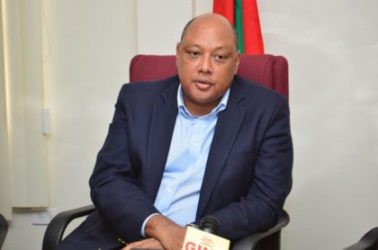Government is proceeding with the creation of a petroleum directorate which will be charged with local administrative responsibilities for the country’s oil and gas sector, though Natural Resources Minister Raphael Trotman has told Stabroek Business that he favours not making further information on the key institution public until Cabinet has considered his submission on the matter.
The minister disclosed however, that the local petroleum directorate was likely to be created along the design of the Norwegian model which is widely regarded as having been successful in overseeing the operations of the country’s petroleum sector.

The Norwegian Petroleum Directorate (NPD) functions as an independent state administration body reporting to the Ministry of Petroleum and Energy. It is tasked with managing the oil and gas resources on the Norwegian continental shelf, the first production licences for which were granted in 1965.
The NPD performs a wide range of functions in the country’s oil and gas sector including issues relating to resource management and administration on behalf of the Ministry of Petroleum and Energy as well as environmental taxes on behalf of the country’s Ministry of Finance.
The Ministry of Petroleum and Energy and the NPD are responsible for the framework conditions in all phases of the petroleum activities.
One of the key functions of the NPD is to ensure that the petroleum activities minimize discharges and emissions into to the external environment. The NPD is also in charge of collecting the CO2 tax from the Norwegian shelf, conducting metering audits and collecting fees from the petroleum activities.
Another of the NPD’s tasks is to have the best possible information on the petroleum resources on the Norwegian continental shelf and to manage and further develop this information.
Trotman had earlier said that the creation of an effective local petroleum directorate would necessitate the recruitment of skills from outside Guyana since the range of skills necessary to ensure the efficient discharge of the responsibilities of the petroleum Directorate was unlikely to be found in Guyana.
He added that financial provisions for the local petroleum directorate would be made in the country’s 2017 budget.
Meanwhile, Trotman said last week that the appointment by the government in Trinidad and Tobago of a new Minister of Energy had created a “pause” in the creation of the planned Memorandum of Understanding between the two countries under which Port of Spain will provide various forms of support to the oil and gas sector in Guyana. Late last month the administration of Dr Keith Rowley announced that it was replacing Nicole Olivierre as Minister of Energy. Olivierre had travelled to Guyana with Franklin Khan, who had served in technical and executive capacities with the state-controlled Petrotrin as well as in the private oil and gas sector, for talks with the authorities here about Trinidad and Tobago’s support for the development of Guyana’s oil and gas sector.




